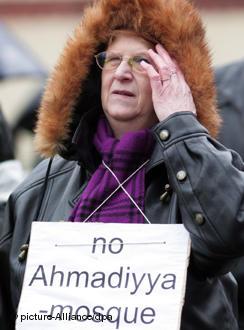 Scattered protests Tuesday accompanied a ground-breaking ceremony for the first-ever mosque in what used to be Communist East Berlin.
Scattered protests Tuesday accompanied a ground-breaking ceremony for the first-ever mosque in what used to be Communist East Berlin.
The two-story building with a 12-meter-tall minaret is being built for the Ahmadiyya Muslim community on the site of an old sauerkraut factory in the east Berlin suburb of Pankow-Heinersdorf.
The mosque, which will be able to accommodate 500 worshippers, is expected to be completed by the end of next year or in early 2008, said the chairman of the sect’s Berlin branch, Abdul Basit Tariq.
Scattered protests Tuesday accompanied a ground-breaking ceremony for the first-ever mosque in what used to be Communist East Berlin.
The two-story building with a 12-meter-tall minaret is being built for the Ahmadiyya Muslim community on the site of an old sauerkraut factory in the east Berlin suburb of Pankow-Heinersdorf.
The mosque, which will be able to accommodate 500 worshippers, is expected to be completed by the end of next year or in early 2008, said the chairman of the sect’s Berlin branch, Abdul Basit Tariq.
In Berlin, the first mosque was constructed in 1924. Now there are some 30 Muslim places of worship in the German capital. But most of them are in Neukölln and Kreuzberg, in the western part of the city.
These are the neighborhoods in which guest workers, mainly from Turkey, moved to when they first arrived in Germany in the 1960s and 1970s. Today the multi-ethnic districts are still home to Berlin’s largest Turkish community as well as to large numbers of Arab and east European immigrants.
In the former Communist and, at the time, internationally insular East Berlin, there were no mosques which might explain the protests, Tariq says.
“These are unfounded fears,” Tariq says. “People listen to the news, see scenes on television and that’s why they’re scared of Muslims. They think Muslims are terrorists and suicide bombers. Their heads are full of these things.”
Opposition to the planned mosque has underlined Germany’s problems in integrating its 3.2-million strong Muslim community. The problem is especially acute in formerly communist-ruled east Germany where few Muslims and other immigrants have settled.
